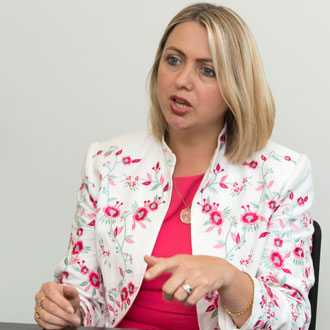Don’t denigrate profession in front of trainees, RCGP chair tells GPs

GPs should avoid making negative comments about the general practice profession in front of trainees, according to the chair of the RCGP.
Speaking at Pulse Live Birmingham, Professor Helen Stokes-Lampard suggested that although GPs do need to vent their frustrations, they should do so only when in the company of senior colleagues.
This follows earlier suggestions from RCGP for medical schools to crack down on negative ‘banter’ against general practice as a profession.
Professor Stokes-Lampard said: ‘We all need a safe space to be negative and a safe space to vent. Use your peers and your seniors to vent. Don’t vent on your juniors, it’s destructive and unhelpful.’
She added: ‘For every negative thing you say to a trainee, somebody else has got to say ten or more good things to reassure them there is a future for general practice.’
At the same conference, Professor Stokes-Lampard also addressed the thorny question of GPs moving to a salaried model – after being forced to deny earlier this year that the GP partnership model was ‘unfit for purpose’.
Professor Stokes-Lampard told the Pulse Live audience: ‘The partnership model won’t be right for every area of the country. Indeed in [one area of] Brighton all seven practices have handed back their contract. They just couldn’t recruit. The partnership model died there.’
Brighton has seen seven practices close in the past two years – including four closures that have displaced a total of almost 9,000 patients since NHS England’s support package was announced in April last year – and an eighth is due to close later this year.
Professor Stokes-Lampard also said that she was personally ‘sad’ that some areas had lost the partnership-model approach. But she pointed out that some areas do go salaried ‘because they’re visionary and some do it out of desperation’.
She added: ‘It’s sad but it’s the way it is. I’m not going to try and hide the truth. This is a fact.
‘Some parts of central London, some parts of Birmingham, and well Brighton, [the partnership model] is gone.
‘It was too late, it was too difficult, they had to do something different and be creative. And they have turned it into a success in some places.’
She warned that the hardest thing about changing from a partnership model to a salaried one is retaining sensitive patient care.
‘If you care about your patients, you want to have a long-term relationship with those who need it.
‘You get a better therapeutic relationship if you know the patient, their contacts, their family, their social and psychological factors as well as their physical – and retaining that is difficult but it’s being done brilliantly in some places.’
Should GPs talk up the profession to new entrants?
Professor Stokes-Lampard’s comments come as the GP recruitment crisis does not appear to be showing any signs of recovery.
In May, Pulse’s annual practice vacancies survey was answered by 860 GPs and revealed that 12.2% of all positions are currently vacant – up from the 11.7% reported at the same time last year.
The RCGP and Royal College of Psychiatrists teamed up last year to call for an end to negative ‘banter’ in medical schools, which they claimed amounted to ‘systematic denigration’ of general practice and psychiatry careers, putting off graduates from choosing the specialties.
Although the campaign had the hashtag #banthebash, the colleges insisted at the time they were not about ‘prohibition of banter’ but about ‘fostering respect between specialties’.
Meanwhile, medical schools which aim to boost GP trainee uptake by exposing students to general practice could see extra funding, under Government plans outlined earlier this year.
Pulse October survey
Take our July 2025 survey to potentially win £1.000 worth of tokens











